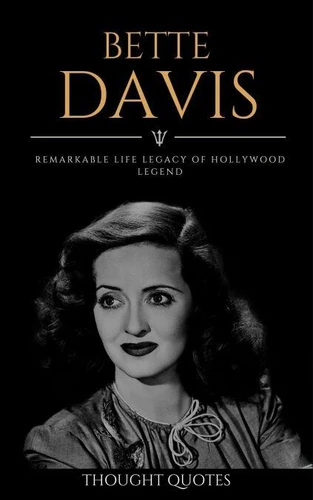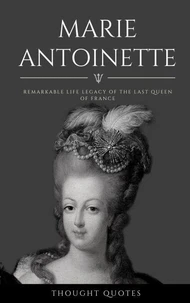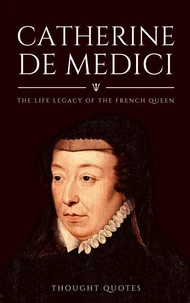Bette Davis : Remarkable Life Legacy of Hollywood Legend
Par :Formats :
Disponible dans votre compte client Decitre ou Furet du Nord dès validation de votre commande. Le format ePub est :
- Compatible avec une lecture sur My Vivlio (smartphone, tablette, ordinateur)
- Compatible avec une lecture sur liseuses Vivlio
- Pour les liseuses autres que Vivlio, vous devez utiliser le logiciel Adobe Digital Edition. Non compatible avec la lecture sur les liseuses Kindle, Remarkable et Sony
 , qui est-ce ?
, qui est-ce ?Notre partenaire de plateforme de lecture numérique où vous retrouverez l'ensemble de vos ebooks gratuitement
Pour en savoir plus sur nos ebooks, consultez notre aide en ligne ici
- FormatePub
- ISBN8227972699
- EAN9798227972699
- Date de parution31/12/2024
- Protection num.pas de protection
- Infos supplémentairesepub
- ÉditeurBig Dog Books, LLC
Résumé
There were many bright stars in Hollywood's golden age, but Bette Davis stood out as being particularly bright and fiery. Ruth Elizabeth "Bette" Davis was born on April 5, 1908, in Lowell, Massachusetts. She went from being a determined girl from New England to an unstoppable force that changed the way American movies were made. With her unique eyes, clipped voice, and always-present cigarette, Davis created a character that went beyond being famous.
She stood out in a time when most actresses desperately sought out glamorous parts because she was willing to play complex, unlikable characters. Through sheer determination and undeniable ability, she won two Academy Awards and was nominated ten times. She was also the first woman to receive the American Film Institute's Lifetime Achievement Award. From her first big part in "Of Human Bondage" to her famous turn in "All About Eve, " Davis's career spanned 60 years and more than 100 movies.
Hollywood legends say that she fought hard with Warner Brothers studios for better parts and creative freedom, which is how she got the nickname "The Fourth Warner Brother." She fought for more than just her own benefits. During World War II, she helped start the Hollywood Canteen to entertain and support soldiers, and she later became the first woman to lead the Academy of Motion Picture Arts and Sciences. It was said that she was a tough public figure, but her real life was often just as dramatic as the drama in her movies.
She was married four times and raised her kids by herself. She also dealt with many personal problems with the same resolve that she used at work. Even in her last years, when she was fighting breast cancer and having a stroke, she kept acting until just before she died in 1989. Davis's impact goes far beyond the movies she was in. She changed what it meant to be a leading lady in Hollywood by showing that hard work and ability could beat conventional beauty.
Many actors have been inspired by her bravery to go against the norms in the business and her unwavering dedication to her work. The American Film Institute ranked her second on their list of the greatest female stars of classic Hollywood movies in 1999, recognizing her lasting effect and solidifying her place as one of the most important people in movie history.
She stood out in a time when most actresses desperately sought out glamorous parts because she was willing to play complex, unlikable characters. Through sheer determination and undeniable ability, she won two Academy Awards and was nominated ten times. She was also the first woman to receive the American Film Institute's Lifetime Achievement Award. From her first big part in "Of Human Bondage" to her famous turn in "All About Eve, " Davis's career spanned 60 years and more than 100 movies.
Hollywood legends say that she fought hard with Warner Brothers studios for better parts and creative freedom, which is how she got the nickname "The Fourth Warner Brother." She fought for more than just her own benefits. During World War II, she helped start the Hollywood Canteen to entertain and support soldiers, and she later became the first woman to lead the Academy of Motion Picture Arts and Sciences. It was said that she was a tough public figure, but her real life was often just as dramatic as the drama in her movies.
She was married four times and raised her kids by herself. She also dealt with many personal problems with the same resolve that she used at work. Even in her last years, when she was fighting breast cancer and having a stroke, she kept acting until just before she died in 1989. Davis's impact goes far beyond the movies she was in. She changed what it meant to be a leading lady in Hollywood by showing that hard work and ability could beat conventional beauty.
Many actors have been inspired by her bravery to go against the norms in the business and her unwavering dedication to her work. The American Film Institute ranked her second on their list of the greatest female stars of classic Hollywood movies in 1999, recognizing her lasting effect and solidifying her place as one of the most important people in movie history.
There were many bright stars in Hollywood's golden age, but Bette Davis stood out as being particularly bright and fiery. Ruth Elizabeth "Bette" Davis was born on April 5, 1908, in Lowell, Massachusetts. She went from being a determined girl from New England to an unstoppable force that changed the way American movies were made. With her unique eyes, clipped voice, and always-present cigarette, Davis created a character that went beyond being famous.
She stood out in a time when most actresses desperately sought out glamorous parts because she was willing to play complex, unlikable characters. Through sheer determination and undeniable ability, she won two Academy Awards and was nominated ten times. She was also the first woman to receive the American Film Institute's Lifetime Achievement Award. From her first big part in "Of Human Bondage" to her famous turn in "All About Eve, " Davis's career spanned 60 years and more than 100 movies.
Hollywood legends say that she fought hard with Warner Brothers studios for better parts and creative freedom, which is how she got the nickname "The Fourth Warner Brother." She fought for more than just her own benefits. During World War II, she helped start the Hollywood Canteen to entertain and support soldiers, and she later became the first woman to lead the Academy of Motion Picture Arts and Sciences. It was said that she was a tough public figure, but her real life was often just as dramatic as the drama in her movies.
She was married four times and raised her kids by herself. She also dealt with many personal problems with the same resolve that she used at work. Even in her last years, when she was fighting breast cancer and having a stroke, she kept acting until just before she died in 1989. Davis's impact goes far beyond the movies she was in. She changed what it meant to be a leading lady in Hollywood by showing that hard work and ability could beat conventional beauty.
Many actors have been inspired by her bravery to go against the norms in the business and her unwavering dedication to her work. The American Film Institute ranked her second on their list of the greatest female stars of classic Hollywood movies in 1999, recognizing her lasting effect and solidifying her place as one of the most important people in movie history.
She stood out in a time when most actresses desperately sought out glamorous parts because she was willing to play complex, unlikable characters. Through sheer determination and undeniable ability, she won two Academy Awards and was nominated ten times. She was also the first woman to receive the American Film Institute's Lifetime Achievement Award. From her first big part in "Of Human Bondage" to her famous turn in "All About Eve, " Davis's career spanned 60 years and more than 100 movies.
Hollywood legends say that she fought hard with Warner Brothers studios for better parts and creative freedom, which is how she got the nickname "The Fourth Warner Brother." She fought for more than just her own benefits. During World War II, she helped start the Hollywood Canteen to entertain and support soldiers, and she later became the first woman to lead the Academy of Motion Picture Arts and Sciences. It was said that she was a tough public figure, but her real life was often just as dramatic as the drama in her movies.
She was married four times and raised her kids by herself. She also dealt with many personal problems with the same resolve that she used at work. Even in her last years, when she was fighting breast cancer and having a stroke, she kept acting until just before she died in 1989. Davis's impact goes far beyond the movies she was in. She changed what it meant to be a leading lady in Hollywood by showing that hard work and ability could beat conventional beauty.
Many actors have been inspired by her bravery to go against the norms in the business and her unwavering dedication to her work. The American Film Institute ranked her second on their list of the greatest female stars of classic Hollywood movies in 1999, recognizing her lasting effect and solidifying her place as one of the most important people in movie history.











